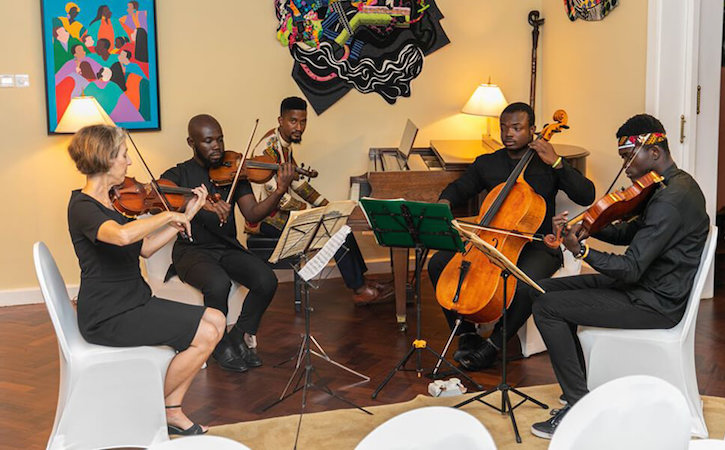For Fulbright, Professor Ruotolo Explores Ghanaians’ Relationship to American Culture and Makes Detour into Classical Music

During Humanities Professor Cristina Ruotolo’s Fulbright scholarship at University of Ghana in 2018 – 19, she was invited to direct its string ensemble, which put her in contact with the city of Accra’s burgeoning classical music scene. As a result, the classically trained violinist expanded her Fulbright project, teaching and performing violin alongside her primary work of teaching courses on American literature and culture.
“I discovered that, contrary to my own vague expectations, young Ghanaians were very interested in learning to play string instruments associated with classical music — particularly the violin,” she said.
Ruotolo offered lessons and ensemble coachings to both beginners and more advanced string players, several of whom play with the National Symphony Orchestra. She also taught string players at a boarding school devoted to former street children.
“[My experience] has reawakened my own passion for music education, and also my conviction that musical spaces can be uniquely powerful for creating meaningful community across cultural and social differences,” Ruotolo said. “Along with my work in the [University of Ghana] English department, the detour I took into working with Ghanaian musicians will influence my teaching going forward. More than ever, I’m committed to getting my students to think critically about how diverse forms of cultural expression reflect and shape who and how we are in the world.”
Life in Ghana
In University of Ghana’s English department, Ruotolo’s research came to focus on thinking about new ways to teach U.S. culture in a comparative context, particularly in comparison or juxtaposition with West African works.
Ruotolo and her colleague at Ghana, Kwabena Opoku-Agyemang, have developed a graduate course on Accra and San Francisco — to be offered this fall 2020 as Comparative Cities (Humanities 750). It will be taught simultaneously at SF State and University of Ghana. The students will interact online, discussing novels and other cultural works from both locations and teaching one another about their contemporary cities. The new course is inspired by SF State’s Biography of a City courses and Ato Quayson’s book “Oxford Street,” which analyzes Accra’s main commercial district as a network of cultural texts.
“Kwabena and I were both eager to create a meaningful space for Ghanaian students to produce knowledge about their own world for an engaged audience,” Ruotolo said. “And, of course, the same will be true for our students at SF State.”
Ruotolo said she loved teaching at University of Ghana, which is located in a suburb of Accra, the nation’s capital and largest city. She lived on campus, where her teenage daughter attended University Basic School. “My students and my colleagues in the English department were wonderful to work with, and I treasure the connections and friendships I made there,” she said.
Over three semesters, Ruotolo taught an undergraduate course in American literature and co-taught a graduate course in American literature. She also taught several courses that did not primarily focus on U.S. literature, including an introductory undergraduate course in practical criticism and graduate seminars in postcolonial literature and literary theory.
“Most of what I had taught [prior to my Fulbright in Ghana] hailed from either Nigeria or Senegal, but I was interested in the question of how the canon of African literature taught in the U.S. is formed, and why certain literatures [i.e., Nigerian] gain a transnational readership while others might not,” said Ruotolo, who joined SF State in 1997.
Ruotolo plans to return to Accra next year to teach at a new summer music workshop.
Fulbright Program
The Fulbright Program, sponsored by the U.S. Department of State’s Bureau of Educational and Cultural Affairs, is the federal government’s flagship international exchange program. Since its inception in 1946, the Fulbright Program has provided more than 380,000 participants with the opportunity to study, teach and conduct research, exchange ideas and contribute to finding solutions to shared international concerns. The Core Fulbright Scholar Program offers nearly 470 teaching, research or combination teaching/research awards in more than 125 countries.
— Ufuoma Umusu